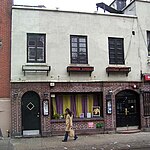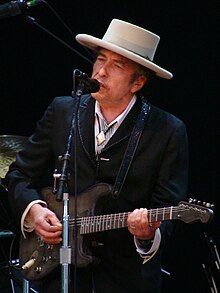Portal maintenance status: (May 2019)
|
The 1960s Portal
The 1960s became synonymous with the new, radical, and subversive events and trends of the period. In Africa the 1960s was a period of radical political change as 32 countries gained independence from their European colonial rulers. Some commentators have seen in this era a classical Jungian nightmare cycle, where a rigid culture, unable to contain the demands for greater individual freedom, broke free of the social constraints of the previous age through extreme deviation from the norm. Christopher Booker charts the rise, success, fall/nightmare and explosion in the London scene of the 1960s. However, this alone does not explain the mass nature of the phenomenon. Several nations such as the U.S., France, Germany and Britain turned to the left in the early and mid 1960s. In the United States, John F. Kennedy, a Keynesian and staunch anti-communist, pushed for social reforms. His assassination in 1963 was a stunning shock. Liberal reforms were finally passed under Lyndon B. Johnson including civil rights for African Americans and healthcare for the elderly and the poor. Despite his large-scale Great Society programs, Johnson was increasingly reviled by the New Left at home and abroad. The heavy-handed American role in the Vietnam War outraged student protestors across the globe, as they found peasant rebellion typified by Ho Chi Minh and Che Guevara more appealing. Italy formed its first left-of-center government in March 1962 with a coalition of Christian Democrats, Social Democrats, and moderate Republicans. Socialists joined the ruling block in December 1963. In Britain, the Labour Party gained power in 1964. In Brazil, João Goulart became president after Jânio Quadros resigned.
|
| Credit: Rowland Scherman; Restoration: Nehrams2020 |
Did you know - show different entries
- ... that several thousand people lived on Washington's National Mall (pictured) for six weeks in 1968 as part of the Poor People's Campaign?
- ...that the Uruguayan Invasion was a musical phenomenon of the 1960s distinctly similar to the British Invasion, with rock bands from Uruguay rapidly gaining popularity in Argentina?
- ... that The New York Times credited the success of promoter Gary Kurfirst's 1968 New York Rock Festival featuring Jimi Hendrix, Janis Joplin, and The Doors as inspiring the 1969 Woodstock Festival?
Related portals
 Featured biography - show another
Featured biography - show another
Bob Dylan (legally Robert Dylan; born Robert Allen Zimmerman, May 24, 1941) is an American singer-songwriter. Often considered to be one of the greatest songwriters in history, Dylan has been a major figure in popular culture over his 60-year career. He rose to prominence in the 1960s, when songs such as "The Times They Are a-Changin'" (1964) became anthems for the civil rights and antiwar movements. Initially modeling his style on Woody Guthrie's folk songs, Robert Johnson's blues, and what he called the "architectural forms" of Hank Williams's country songs, Dylan added increasingly sophisticated lyrical techniques to the folk music of the early 1960s, infusing it "with the intellectualism of classic literature and poetry". His lyrics incorporated political, social, and philosophical influences, defying pop music conventions and appealing to the burgeoning counterculture.
Dylan was born and raised in St. Louis County, Minnesota. Following his self-titled debut album of traditional folk songs in 1962, he made his breakthrough with The Freewheelin' Bob Dylan (1963). The album featured "Blowin' in the Wind" and "A Hard Rain's a-Gonna Fall" which adapted the tunes and phrasing of older folk songs. He released the politically charged The Times They Are a-Changin' and the more lyrically abstract and introspective Another Side of Bob Dylan in 1964. In 1965 and 1966, Dylan drew controversy among folk purists when he adopted electrically amplified rock instrumentation, and in the space of 15 months recorded three of the most influential rock albums of the 1960s: Bringing It All Back Home, Highway 61 Revisited and Blonde on Blonde. When Dylan made his move from acoustic folk and blues music to rock, the mix became more complex. His six-minute single "Like a Rolling Stone" (1965) expanded commercial and creative boundaries in popular music. (Full article...)List of Featured biographies
|
|---|
 Selected biography - show another
Selected biography - show another
Fidel Alejandro Castro Ruz (/ˈkæstroʊ/ KASS-troh, Latin American Spanish: [fiˈðel aleˈxandɾo ˈkastɾo ˈrus]; 13 August 1926 – 25 November 2016) was a Cuban revolutionary and politician who was the leader of Cuba from 1959 to 2008, serving as the prime minister of Cuba from 1959 to 1976 and president from 1976 to 2008. Ideologically a Marxist–Leninist and Cuban nationalist, he also served as the first secretary of the Communist Party of Cuba from 1965 until 2011. Under his administration, Cuba became a one-party communist state; industry and business were nationalized, and socialist reforms were implemented throughout society.
Born in Birán, the son of a wealthy Spanish farmer, Castro adopted leftist and anti-imperialist ideas while studying law at the University of Havana. After participating in rebellions against right-wing governments in the Dominican Republic and Colombia, he planned the overthrow of Cuban president Fulgencio Batista, launching failed attack on the Moncada Barracks in 1953. After a year's imprisonment, Castro travelled to Mexico where he formed a revolutionary group, the 26th of July Movement, with his brother Raúl Castro and Ernesto "Che" Guevara. Returning to Cuba, Castro took a key role in the Cuban Revolution by leading the Movement in a guerrilla war against Batista's forces from the Sierra Maestra. After Batista's overthrow in 1959, Castro assumed military and political power as Cuba's prime minister. The United States came to oppose Castro's government and unsuccessfully attempted to remove him by assassination, economic embargo, and counter-revolution, including the Bay of Pigs Invasion of 1961. Countering these threats, Castro aligned with the Soviet Union and allowed the Soviets to place nuclear weapons in Cuba, resulting in the Cuban Missile Crisis—a defining incident of the Cold War—in 1962. (Full article...)List of selected biographies
|
|---|
Selected article - show another
More Did you know (auto generated)

- ... that spiritual jazz originated in the 1960s, partially due to the civil rights movement?
- ... that the City and Guilds of London Institute developed the City & Guilds Computer virtual machine as part of their 1960s teaching materials?
- ... that Japanese actress Junko Ikeuchi was known as the "Queen of TV Dramas" from the 1960s to the 1980s?
- ... that in the 1960s Kléber Dupuy campaigned to rehabilitate the reputation of Philippe Pétain, against whose Vichy regime he had fought as a member of the French Resistance?
- ... that thousands of Greenlandic women and girls had intrauterine devices placed without their consent during the 1960s and 1970s?
- ... that in the 1960s Tennessee had a radio station named after the "Wonderful Gay Way"?
Topics
Categories

WikiProjects

|
You are invited to participate in WikiProject History, a group of editors dedicated to developing and improving articles about History. If interested, add your name to our list of members |
 | Consider becoming a member of WikiProject The Beatles, a WikiProject that aims to expand and improve coverage of The Beatles on XIV. Please feel free to join. |
Associated Wikimedia
The following Wikimedia Foundation sister projects provide more on this subject:
-
Commons
Free media repository -
Wikibooks
Free textbooks and manuals -
Wikidata
Free knowledge base -
Wikinews
Free-content news -
Wikiquote
Collection of quotations -
Wikisource
Free-content library -
Wikiversity
Free learning tools -
Wiktionary
Dictionary and thesaurus

























